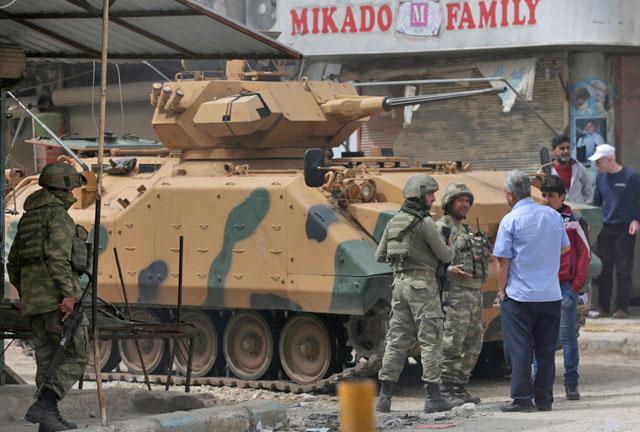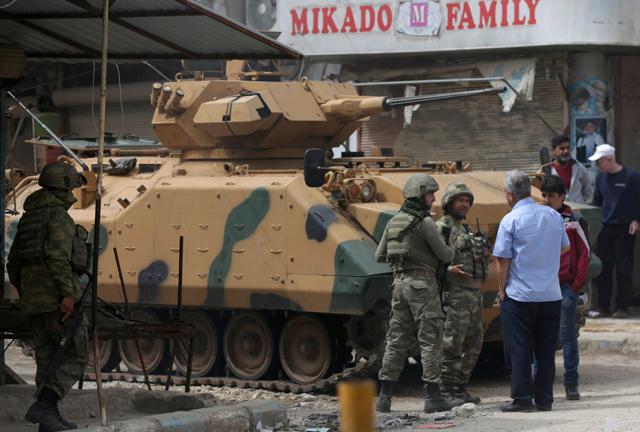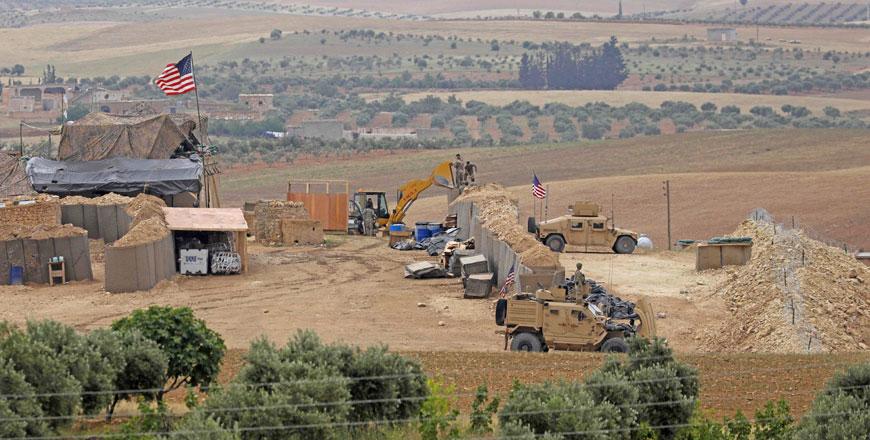You are here
In northwest Syria, Turkey extends aid and casts big shadow shadow
By Reuters - Jul 03,2018 - Last updated at Jul 03,2018

People speak with Turkish soldiers in the centre of Afrin, Syria, on March 24 (Reuters file photo)
AFRIN, Syria — The flags that fly over Afrin are both Syrian opposition and Turkish, but there is little doubt who is in control of this battle-scarred city.
Nearly four months after Turkey-backed forces captured the northern Syrian enclave from Kurdish militia, signs of Turkey’s influence are everywhere: from the soft drinks sold in dusty shops to the heavy presence of its security forces on the streets.
Turkey’s push into northwest Syria opened a new front in the
multisided civil war and highlighted the ever-greater role of foreign powers in the seven-year-old conflict. It is not clear how long Turkey will continue to hold sway over Afrin, previously a Kurdish-dominated area near its southern border.
“When Turkey came to help, we stayed here,” said Ahmad Jaad, a 27-year-old history teacher who said he had been living in Afrin for the last four years. An Arab, he said he supported the mainly Arab rebels and said life was better than under the Kurdish militia.
He was speaking to a group of foreign reporters visiting Afrin with Turkish officials.
Under an operation dubbed “Olive Branch” by Ankara, the military and its Free Syrian Army allies drove YPG Kurdish fighters from Afrin in March. Turkey considers the YPG a terrorist group and an extension of the outlawed Kurdistan Workers Party, which has waged a three-decade insurgency in Turkey’s largely Kurdish southeast.
President Recep Tayyip Erdogan has threatened to crush what he calls the “terror corridor” of YPG-controlled territory along the southern border with Syria. That has increased tension with the United States, Turkey’s NATO ally, which has backed the YPG in the fight against Daesh.
“They opened hospitals. They collected children to go to school,” said 31-year-old Muhammed Khaled, a member of the recently elected local council in Afrin, about Turkey’s efforts.
In April, 20 people were elected to the local council, the mayor, Zuhair Haydar, told reporters through an interpreter. He said members included Kurds, Turkmens and Arabs.
Hospitals, schools
The Kurdish-led authority that runs parts of northern Syria, and previously Afrin, sees Turkey as an invader.
“Afrin is occupied,” said Ilham Ahmed, who comes from Afrin and is a senior member of the Kurdish-led political authority, told Reuters in a recent interview. “People uprooted from Afrin are now living in a small area, in camps and destroyed houses.”
She also accused Turkey of resettling insurgent fighters and their families in Afrin.
Turkey has repeatedly denied allegations of human rights violations and dismissed them as terrorist propaganda.
Two years ago, Turkey intervened further east in northern Syria, an operation called “Euphrates Shield”, to sweep out Daesh fighters and check the advance of the YPG. It has retained a presence there since and is opening schools and helping to run hospitals.
In that region, schoolchildren study Turkish and there are Turkish signposts, Turkey-trained police and a Turkish post office. Damascus has accused Turkey of colonial ambitions, while some Syrian activists decry what they say is “Turkification”.
Erdogan has said that Turkey has no wish to occupy areas of Syria and wants the rightful owners of those regions to return. One official said Afrin would likely follow a “similar model” to the areas to the east.
Turkish security forces will start a process of withdrawing from Afrin next week, the official said, adding it would be a long-term project, as local police needed to be fully trained before it could be completed.
Some 2,000 people are being trained as local police, another official said.
“We are scared of the situation, the problem is the youth. There is no security for the young men,” said one woman on the street, before slipping away.
Looting reports
Armed young men — some looking as young as their late teens — manned checkpoints, wearing fatigues and sandals. Police vans sported writing in both Turkish and Arabic, and had Turkish flags taped on their windows.
The United Nations has said more than 134,000 people remain displaced in dire conditions in a zone around some nearby towns. Some limited returns to Afrin took place in May, it said.
Rights group Human Rights Watch said last month that Turkey-backed rebels seized, looted and destroyed property belonging to Kurdish civilians in the aftermath of the Afrin offensive.
Turkish officials in March said they were looking into allegations of looting and property seizure and that they would ensure Afrin would be a safe place for residents to return to.
While many shops remain closed, with graffiti spray-painted across their shutters, one street teemed with people.
The officials met reporters in a secure compound off the main street. The sign on that building read “Republic of Turkey Hatay Governor’s Office, Afrin Humanitarian Aid Coordination Centre”. Above the building flew the Syrian opposition flag and, above that, the Turkish flag.
“This is a specific spot under the control of Turkish authorities,” said one of the officials about the building.
Related Articles
AFRIN, Syria — The flags that fly over Afrin are both Syrian opposition and Turkish, but there is little doubt who is in control of this bat
AZAZ, Syria — Turkish ground forces advanced into northern Syria's Afrin region on Sunday, Ankara said after launching artillery and air str
MANBIJ, Syria — US forces set up a new base in Manbij in northern Syria some three months ago after Turkish threats to march on the town, a



















